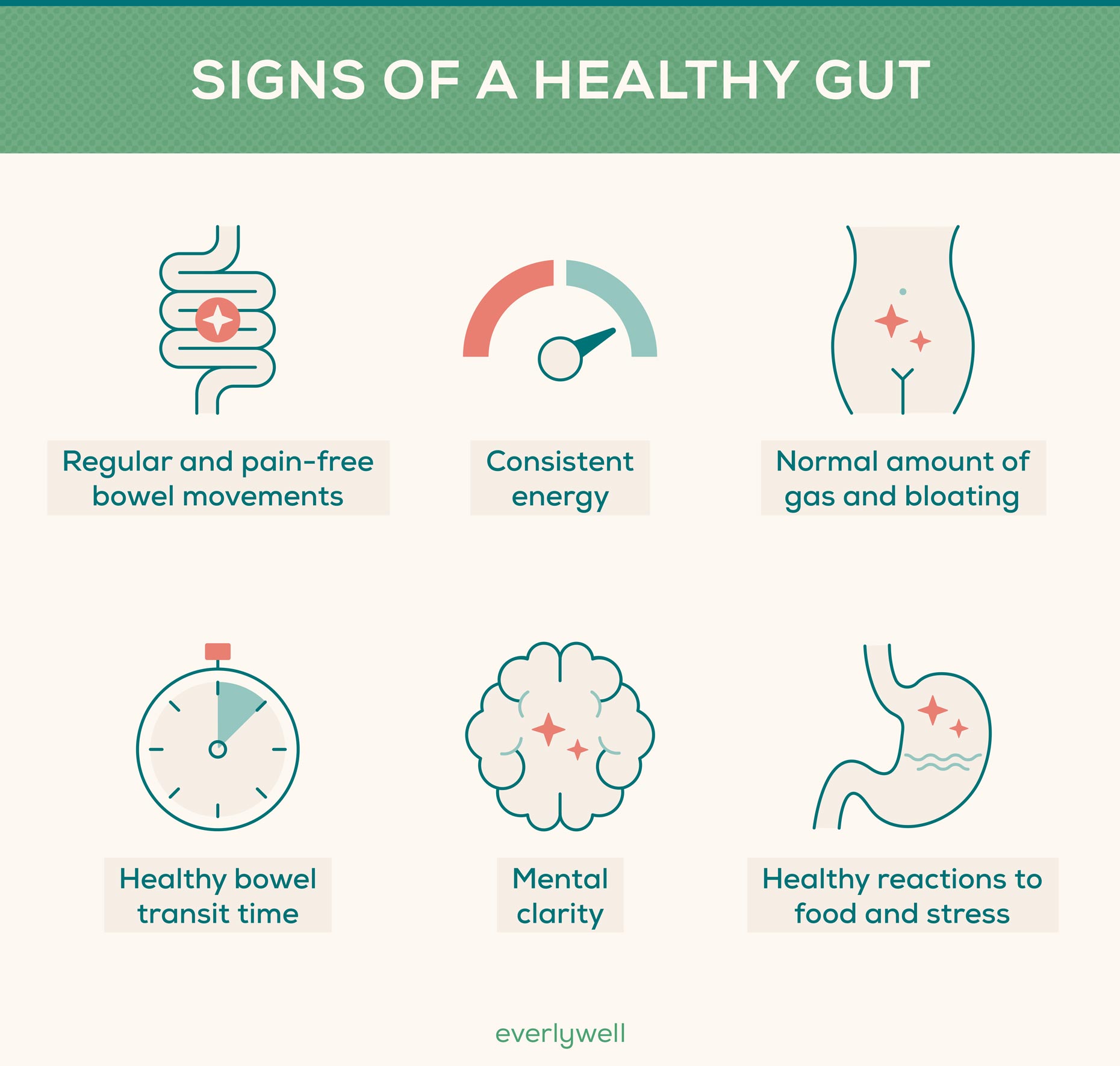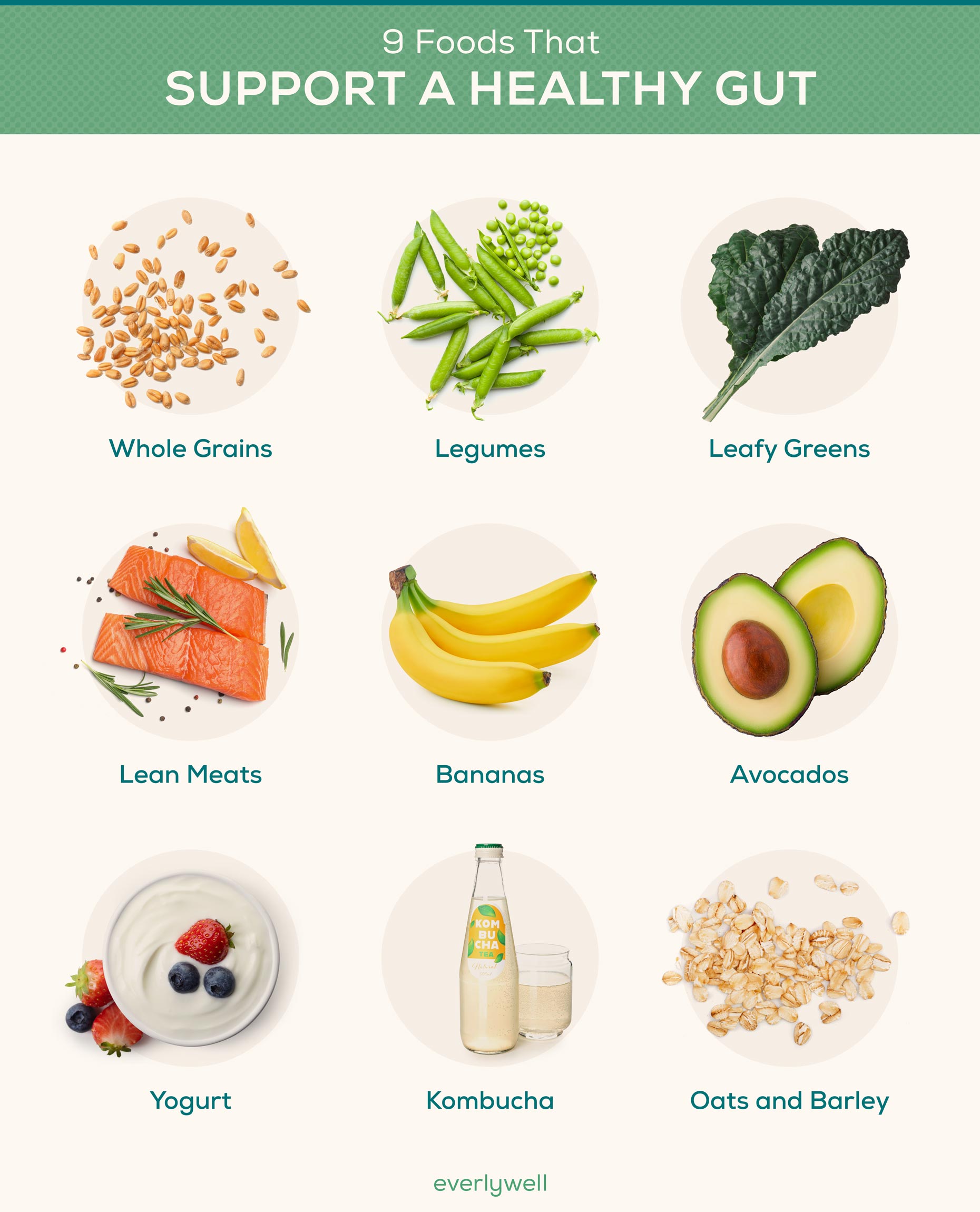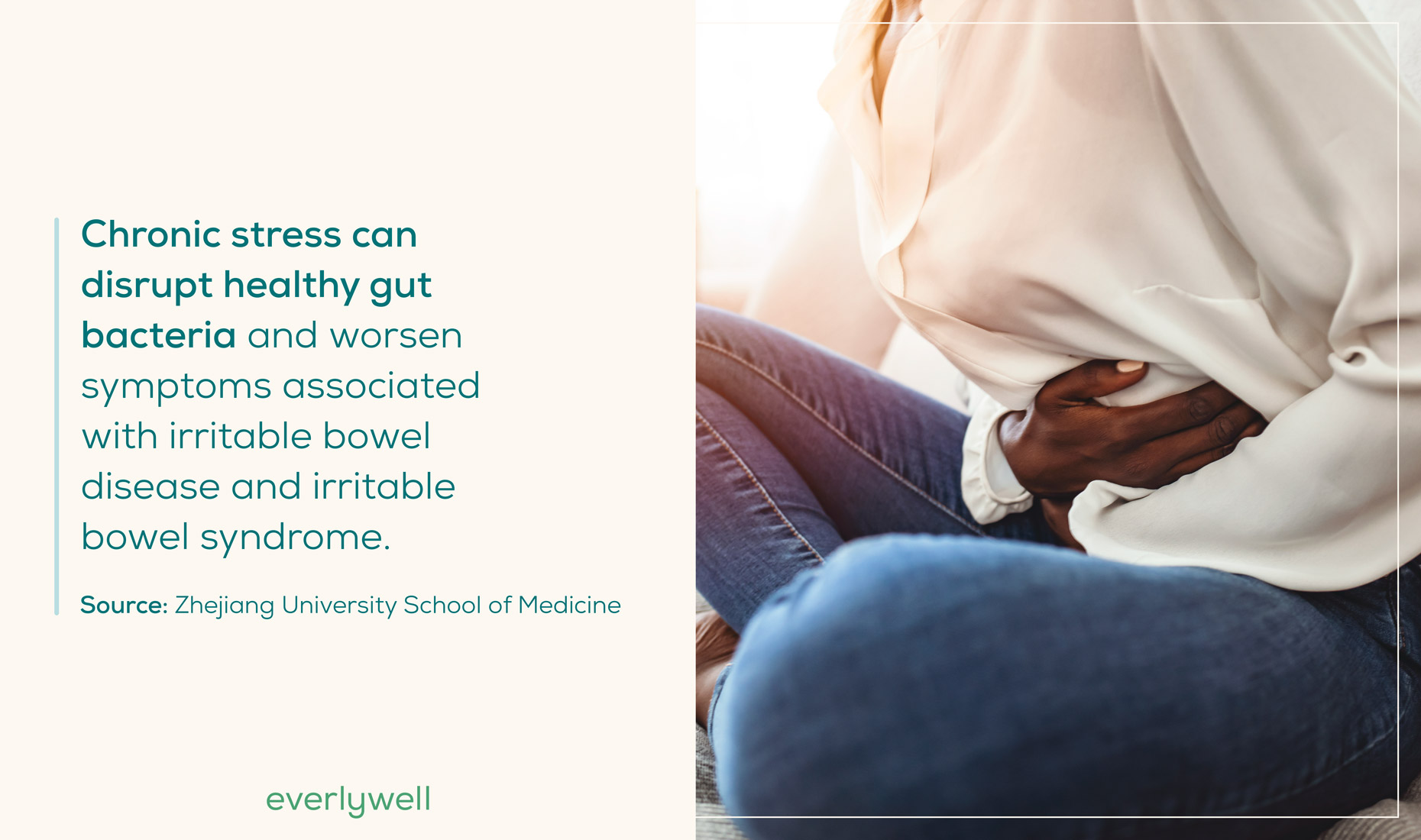
7 Signs of a Healthy Gut + Tips To Improve Digestive Health
Medically reviewed on June 16, 2022 by Jordan Stachel, M.S., RDN, CPT. To give you technically accurate, evidence-based information, content published on the Everlywell blog is reviewed by credentialed professionals with expertise in medical and bioscience fields.
Multiple factors can influence gut health, from diet and stress levels to allergies and digestive conditions. To keep your digestive system feeling and functioning at its best, it’s important to recognize the signs of a healthy gut and learn what to do if you notice any changes.
Everybody (and every body!) is different, so it’s a good idea to make an appointment with a healthcare provider if you aren’t sure what’s normal for you. However, there are a few common signs to look out for that can indicate your gut is working as it should.
Read on to learn six signs of a healthy gut, or jump to the infographic below to discover 12 seasonal drinks to aid digestion.
Table of Contents
7 Common Signs of a Healthy Gut

Knowing the signs of a healthy gut can be just as important as knowing the symptoms of an unhealthy one. If you’re wondering whether your digestive tract may be performing at its best, look for the following signs of a healthy gut:
- Regular and pain-free bowel movements
- Consistent energy
- Normal amount of gas and bloating
- Healthy bowel transit time
- Mental clarity
- Healthy reactions to food and stress
1. Regular and Pain-free Bowel Movements
Keeping track of your bowel movements is a good way to keep tabs on your gut health. While everyone’s body is different, most healthcare providers agree that having a bowel movement anywhere from three times a day to three times a week can be considered healthy. That said, what’s normal for you might not be normal for someone else. If you notice any changes in bowel movement frequency that persist for more than a few days, you should talk with your healthcare provider (Related: Colon Cancer Test).
Shape, color, and consistency of bowel movements are also important indicators to keep an eye on. Healthy bowel movements should be smooth, firm, and easy to pass. If you notice that your poop is hard, overly soft, or painful to pass, you could be experiencing diarrhea or constipation.
2. Consistent Energy
If you consistently make it through the day without needing a nap or caffeine as a pick-me-up, it’s a good sign that your body is getting the right nutrients and absorbing them properly. Digesting food requires a lot of energy. If your digestive system isn’t functioning properly, your body might send more stored energy to the stomach or intestines than other internal systems. This can leave you feeling fatigued as your body tries to compensate for the imbalance.
In fact, studies show that there could be a link between chronic fatigue syndrome (CFS) and IBS. Patients with CFS are more likely to have a previous IBS diagnosis and experience digestive issues. If you experience fatigue along with symptoms of IBS, it could be linked to your digestive system.
3. Normal Amount of Gas and Bloating
Passing gas throughout the day is completely normal and generally isn't cause for concern. Gas is a natural part of the digestive process, and releasing it prevents it from building up in the intestines or stomach. In fact, most healthy people pass gas up to 21 times per day.
That said, excess gas can lead to abdominal pain, discomfort, and bloating if it becomes trapped. This is a common problem for people who eat too many gas-producing foods—like beans, starch, and lactose—at one time. However, intestinal infections, digestive disorders, and some medications can also cause excess gas, so you should contact your healthcare provider if you experience recurring symptoms.
4. Healthy Bowel Transit Time
Bowel transit time refers to the amount of time it takes for food to move from the mouth to the end of the digestive tract. In a healthy person, this generally takes 30 to 40 hours but can take up to 72 hours. While you won’t be able to measure this at home, regular bowel movements are a good indicator that food is moving through your body at a healthy pace.
If your healthcare provider suspects that you have impaired bowel function, they can perform a radiopaque marker test to determine bowel transit time. To perform this test, a medical professional will ask you to swallow a capsule or bead containing radiopaque markers. They then track the markers’ movement through your digestive system over time using an X-ray machine. If markers remain after five days, you likely have slowed bowel function.
5. Mental Clarity
Gut health is closely tied to your ability to concentrate and stay mentally alert. If you experience frequent brain fog or struggle to stay focused, poor gut health could be the culprit. Celiac disease and other digestive issues can interfere with nutrient absorption, making it harder for your body to get enough energy. Poor digestion can also interfere with sleep, making it harder to stay alert during the day.
6. Healthy Reactions to Stress
The way your digestive system responds to stress can reveal a lot about your gut health. Chronic stress and depression can alter the balance of microbiota in the digestive tract, increase inflammation, and impact the body’s metabolic response to food. If you experience digestive issues after stressful situations, stress and anxiety could be harming your gut health.
7. No Adverse Reactions to Food
While anyone can fall victim to expired food, if you do experience abdominal pain, excessive bloating, nausea, or diarrhea after eating certain foods, it could point to a food allergy, sensitivity, or other digestive disorder.
What Causes Poor Gut Health?
Digestive issues can have multiple causes, from food allergies or sensitivities to an imbalanced diet. If you’re experiencing abdominal pain, bloating, or any other gastrointestinal symptoms, it could be related to:
- Food allergy or sensitivity: Food allergies and sensitivities can trigger multiple digestive issues. Symptoms can vary depending on the condition’s type and severity, but common issues include diarrhea, abdominal pain, nausea, and vomiting.
- Celiac disease: Celiac disease is an autoimmune disorder that causes damage to the small intestine when a person consumes gluten. It can impact the body’s ability to absorb nutrients and lead to symptoms like chronic fatigue, diarrhea, constipation, abdominal pain, gas, and bloating.
- Imbalanced diet: Your gut needs a variety of nutrients to thrive. Consuming too many foods or drinks high in sugar, artificial sweeteners, saturated and/or trans fats, and animal proteins can contribute to poor gut health and increase the risk of developing certain digestive conditions.
- Chronic stress: Over time, high levels of stress can alter microbiota composition in the gut and lead to a bacterial imbalance. Stress can also increase gut motility (the movement of food through the body), resulting in bouts of diarrhea and/or abdominal pain.
- Smoking: People who smoke are more likely to experience acid reflux and peptic ulcers. Smoking can also make these conditions harder to treat and increase the risk of developing Crohn’s disease and/or cancers of the digestive organs.
- Medications: Certain medications can throw off the bacterial balance in the gut and trigger several digestive symptoms. If you experience digestive issues after starting a new medication, you should discuss your symptoms with your healthcare provider.
How To Improve Your Gut Health
Whether you have a gastrointestinal disorder like IBS or only experience occasional bouts of gas, constipation, or bloating, prioritizing your gut health can go a long way in improving your overall wellness. While a healthcare provider can offer the best advice, the following tips can help you get your digestive health back on track.
Eat a Balanced Diet
Eating the right foods can go a long way in improving your gut health. Limiting foods high in trans-fat, sugar, and salt can help support healthy gut bacteria and reduce the risk of developing certain digestive conditions. If you have a food allergy or sensitivity, try to avoid foods and drinks that trigger your symptoms.
If your diet consists of a lot of fried or processed foods, try swapping them out for foods high in fiber and probiotics. Fiber can reduce constipation and improve bowel transit time, while probiotics support healthy bacteria balance in the gut.

If your current diet isn’t agreeing with you, try slowly integrating some of these gut-friendly foods:
- Whole grain bread and pasta
- Legumes
- Leafy greens
- Oats and barley
- Lean meats like fish, chicken, and turkey
- Bananas
- Avocados
- Yogurt and other probiotic-rich foods
That said, you should talk with your healthcare provider before making any significant diet changes. They can help you identify foods to avoid and make personalized recommendations based on your medical history.
Keep a Food Journal
Whether you suspect that you might have a food allergy or want to ensure that you’re getting the nutrients you need each day, keeping a food journal is a great way to keep track of your diet and identify foods that trigger digestive issues. To start a food journal, simply grab a notebook and write down what you eat for each meal, the main ingredients, how it impacts your mood, and any physical symptoms you notice afterward. For a more structured option, try printing off our daily food consumption journal or downloading a diet tracking app.
Exercise Regularly
Getting into a regular exercise routine is a great way to help support healthy digestion. Physical activity strengthens the diaphragm and abdominal wall and increases blood flow to muscles in the digestive system. Because the colon responds to movement, this can help ease constipation and get bowel movements back on schedule.
However, certain exercises can increase the frequency of digestive problems for some people. If you experience recurring diarrhea or other digestive conditions, you should talk to your healthcare provider before starting a new exercise routine.
Get Enough Sleep
Getting enough sleep is essential for maintaining both digestive and overall health. Inadequate sleep can interfere with digestion and worsen conditions like GERD and inflammatory bowel disease. If you can, try to get at least seven hours of sleep each night. This helps reduce inflammation and allows your body to reduce the production of cortisol, a stress hormone that can interfere with healthy gut bacteria.
Reduce Stress
If you struggle with digestive issues, finding healthy ways to reduce stress and anxiety could help ease your symptoms. Both short-term and long-term stress can disrupt gut function and worsen symptoms of irritable bowel disease or irritable bowel syndrome. To combat this, start by identifying your main stressors and consider how your body responds to them. If you can, try restructuring or reducing stressful tasks and reach out to a mental health professional for help

Testing for Food-Related Issues
If you notice an increase in digestive symptoms after eating, you might have a food allergy, sensitivity, or other condition triggered by certain foods. These can be difficult to identify on your own, so it’s important to talk with a healthcare provider about testing options.
After reviewing your symptoms, a healthcare provider may recommend testing for the following conditions:
- Food allergy: An immunoglobulin E (IgE) food allergy test may be a helpful tool in the process of determining if you have a food allergy. Healthcare providers can perform a blood test or skin prick test to measure your immune system’s reaction to certain foods.
- Celiac disease: An at-home Celiac Disease Screening Test checks for certain antibodies that, if present, may indicate celiac disease. Medical professionals use serology testing to identify antibodies in the blood indicating an immune response to gluten. Because celiac disease is genetic, a genetic test can also help rule it out in certain patients.
- Food intolerance: Having a food intolerance means that your body can’t properly digest certain foods. Healthcare providers can test for lactose intolerance using a hydrogen breath test.
- Food Sensitivity: If your healthcare provider suspects that you have a food sensitivity, they may recommend an elimination diet and careful observation. An at-home Food Sensitivity Comprehensive Test may also help identify foods to be included in a two-part elimination diet.
Don’t take your gut health for granted. By learning the signs of a healthy gut, you’ll be able to recognize symptoms of common digestive issues and seek proper treatment if needed.
If you’re looking for fun ways to prioritize your gut health, check out the infographic below for 12 delicious seasonal drinks to help aid digestion.

Related content
Does gut health have ties to mental health? Here’s what a Registered Dietitian says
Exercise and Digestion: How They're Related
IBS vs. Celiac Disease vs. Gluten Sensitivity: Understanding the Differences
Article Sources
- 1 in 3 Adults Don’t Get Enough Sleep. Centers for Disease Control and Prevention. URL. Accessed May 18, 2022.
- Stress, Depression, Diet, and the Gut Microbiota: Human–Bacteria Interactions at the Core of Psychoneuroimmunology and Nutrition. National Library of Medicine. URL. Accessed May 18, 2022.
- Smoking and the Digestive System. Johns Hopkins Medicine. URL. Accessed May 18, 2022.
- Influence of Diet on the Gut Microbiome and Implications for Human Health. National Library of Medicine. URL. Accessed May 18, 2022.
- Healthy Diet. World Health Organization. URL. Accessed May 18, 2022.
- Current Understanding of Gut Microbiota in Mood Disorders: An Update of Human Studies. National Library of Medicine. URL. Accessed May 18, 2022.
- 5 Foods to Improve Your Digestion. Johns Hopkins Medicine. URL. Accessed May 18, 2022.
- Sleep Disorders Related to Nutrition and Digestive Diseases: A Neglected Clinical Condition. National Library of Medicine. URL. Accessed May 20, 2022.
- Closing America’s Fiber Intake Gap. National Library of Medicine. URL. Accessed May 20, 2022.
- The Best Teas to Drink for Your Health. The Cleveland Clinic. URL. Accessed May 20, 2022.
- Inhibitory Effects of Culinary Herbs and Spices on the Growth of HCA-7 Colorectal Cancer Cells and Their COX-2 Expression. National Library of Medicine. URL. Accessed May 20, 2022.
- Exploring the Benefits of Apple Cider Vinegar. The Cleveland Clinic. URL. Accessed May 20, 2022.
- Gut Inflammation in Chronic Fatigue Syndrome. National Library of Medicine. URL. Accessed May 26, 2022.
- Nutritional Psychiatry: Your Brain on Food. Harvard Medical School. URL. Accessed May 26, 2022.